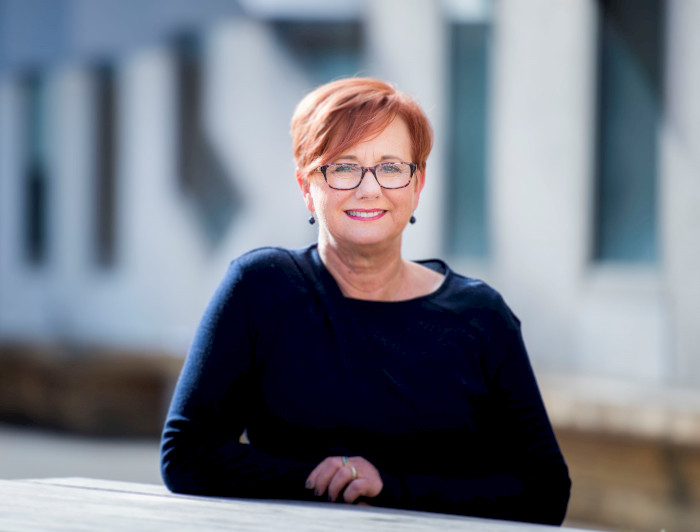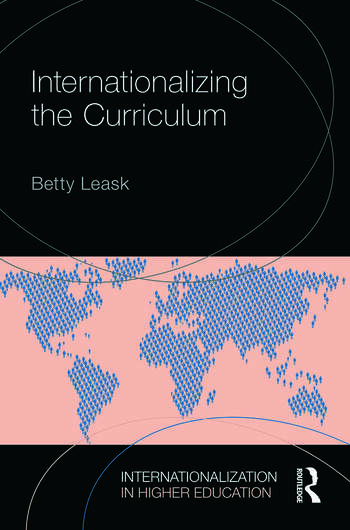Australian expert shares insights on how to build an international curriculum in higher education
Professor Betty Leask —who gave a lecture at UC Chile in April— is a worldwide recognized researcher and consultant regarding the internationalization of the curriculum, teaching and learning in higher education.

photo_camera Professor Betty Leaks has a broad range of experience in universities worldwide as a researcher, consultant and thought leader on the internationalization of the curriculum, teaching and learning in higher education. (Picture: Boston College)
A special guest was invited to the launch of the undergraduate internationalization project at UC Chile (PMI 1966, funded by the Ministry of Education), which took place in April: Betty Leask, Professor Emeritus in the School of Education at La Trobe University.
Recognized internationally as a researcher, consultant and thought leader on the internationalization of the curriculum, teaching and learning in higher education, professor Leask has a broad range of experience in universities worldwide, covering more than 25 years.
From Australia, via Zoom, on April 11th, she gave a keynote lecture on holistic internationalization in higher education for the faculty and staff members of UC Chile.
Later on April 25th, she gave an online talk before the round tables set up by the Direction of Global Learning of the Vice-presidency for International Affairs, which aimed to build institutional definitions of Global Competencies and Internationalization at Home in the university.
“I think this is an excellent initiative,” Professor Leask stated regarding both activities.
“It is really important to start these sorts of things off by developing a shared understanding of what it is that you're talking about when you talk about internationalizing the undergraduate program because this isn't always easy to come to agreement on in an institution”.
“I do know from my work that, the stronger the level of agreement that you can come to at the beginning and the more coherent the leadership is, the more likely you are that the project will have increased benefits for everyone in the institution, not least the students,” explained.
A personal interest in internationalization

For professor Leask, the interest in this topic has been gradual over her entire career: she spent a long time working in high schools with refugee and migrant students.
Also, she worked with these students in pre-university training courses. She became quite interested in other cultures during that time.
“I came from a working-class background and we did not have money to even consider international travel. But working with people from different cultures opened my curiosity to what different types of people are like, what they thought, what prompted them to come to a country so far away from home,” recalled.
She became interested in their adaptation processes, the conflicts they were going through. She started to think about what it would mean for her to go into that space, internationally.
As she stated: “In a way, I became a living example of internationalization beginning at home, being surrounded by the intercultural and fascinated by that”.
As soon as she had the resources to do so, she moved abroad to teach and work. First in Hungary, then in different parts of Asia and finally in the United States.
“The beginning was really a natural curiosity with other kinds of people and how they thought. This beginning point happened a very long time ago, and I have gradually built upon that throughout my career. In terms of the work that I was doing at the University of South Australia over the last 30 years, it was really about considering how faculty members from different disciplines thought and getting their perspective on things, which was fascinating,” explained.
—Could you explain how an internationalized curriculum is reflected in a university? What components do you need to have?
“Internationalization of the curriculum is quite a complex topic.
I think the most important thing is to think backwards about this and consider what kinds of graduates you would like to have from your undergraduate, postgraduate and research programs and the sorts of international or global knowledge, skills and attitudes you would like them to have.
Then you would put in place some kind of strategic plan to ensure that this happens, which should include things happening within the formal curriculum as well as on the campus or co-curriculum through the interactions of students that take place with other students, as well as staff and community members”.
—How does the generation of an international curriculum contribute to the global and inclusive education of a university student?
“That depends on how you define 'curriculum' and how you define 'international'. The key thing is to choose attributes and ensure students can develop these on campus through interactions with other students, staff and community members.
I take a very broad view of curriculum as being inclusive of the description of learning outcomes and how those relate to a particular field of study and practice, teaching and learning activities, pedagogy, assessment activities.
It is what students do and also what teachers do, the way they communicate with students and how they are assessed. It is how things that happen on campus and in the co-curriculum tell the same story and develop the same mindset in students, the same attitudes to diversity and difference, the desire to be inclusive, openness to new ideas. Those sorts of things can all be developed by an international curriculum”.
Challenges with the pandemic
The worldwide pandemic generated by COVID-19 changed the way universities approached their mobility programs.
"I think we did see a shift during the pandemic to online interactions and a recognition that it was necessary to do things differently while mobility was completely paused. There was no face-to-face contact on many campuses. All learning was online and mobility was stopped," professor Leaks stated.
—Do you think the COVID-19 pandemic will affect the processes of curriculum internationalization in universities worldwide?
“I think the big question is to what extent we would have learned from that experience and be more open to different sorts of partnerships that provide opportunities for virtual exchange as well as Collaborative International Online Learning (also called "COIL", for short) and how much they will be used going forward to facilitate the development of global and international understandings and learning for all students. I think that's interesting, and in that way, perhaps the pandemic will have a positive impact on internationalization for all students”.
—How important is it to foster internationalization at home and online programs given the situation of the global pandemic, which has slowed down the progress of traditional mobility programs?
“I think it is really important to continue that focus and consider what that might mean for the sorts of partnerships that are developed and the way internationalization is measured and the way partnerships are measured for their success. Rather than having partnership exchange agreements that talk about the number of students that will move each year, maybe it might be about the number of programs that incorporate an element of collaborative online international learning.
For example, where students in one university in Chile work on a project with students in a university in Australia that could be in engineering and how that is used to really deepen the learning of students on both sides and connect faculty and staff members in very different ways.
There are many possibilities to build on what we did in the pandemic and the experiences we had, recognizing that we do not want to be online all the time, but perhaps we can do some things online that we could not have done in the past if we had not been forced to do things online due to as the pandemic raged around us”.
—How do "global campuses" help to promote the concept of internationalization at home?
"If we focus on the impact of having courses in English and many international students on campus, and ask ourselves are domestic students and staff mixing with international students and staff. We have to ask if everybody is learning.
The research tells us that this does not usually happen. Each one will work quite independently of each other unless there is some sort of intervention, a purpose to work together because it is hard to work across cultures.
There may be language issues. If activities are not related to the course they are doing or their program, it may be very difficult for them to find the time to put in the extra effort. The research over the last 20 years in big receiving countries like Canada, the United States, United Kingdom, Australia, shows that domestic students are the ones most likely to block internationalizing the curriculum for all students at home. It sounds odd, but that's what the research has shown".
Internationalization in Latin America
South America is not unknown to professor Leask. Since 2020, she has been running a project with a higher education institution, developing a questionnaire to learn what staff understand about internationalization at home and what initiatives they are already working on.
The information gathered was used to carry out a workshop initiative that has been going on for two years that situates staff members in the broader internationalization strategy of the university.
She has also done some work with a university from Brazil with Australian funding for internationalizing the curriculum that involved carrying out a Delphi Study to develop some conceptual frameworks of internationalization at home in a Latin American context.
—What is your opinion of state of the art regarding the internationalization of the curriculum in Chile and Latin America?
"It is been really interesting to see the development of internationalization of the curriculum in Chile and Latin America, understanding that Latin America is not homogenous. There are many different countries, different languages spoken, and different cultures.
It has been an interesting learning curve for me to understand the extent of that diversity, the depth of the diversity and what that might mean for the internationalization of the curriculum of different countries within Latin America.
So, I think that actually, many people in Latin America are aware of the challenges. There is a recent understanding that mobility is not the sole way that internationalization can be achieved and that it is necessary to do different things and take different approaches.
There is a great openness to new ideas on what internationalization might mean for curriculum, teaching, learning, students and staff. I find that incredibly invigorating and am delighted to take part in it, every way I can."


